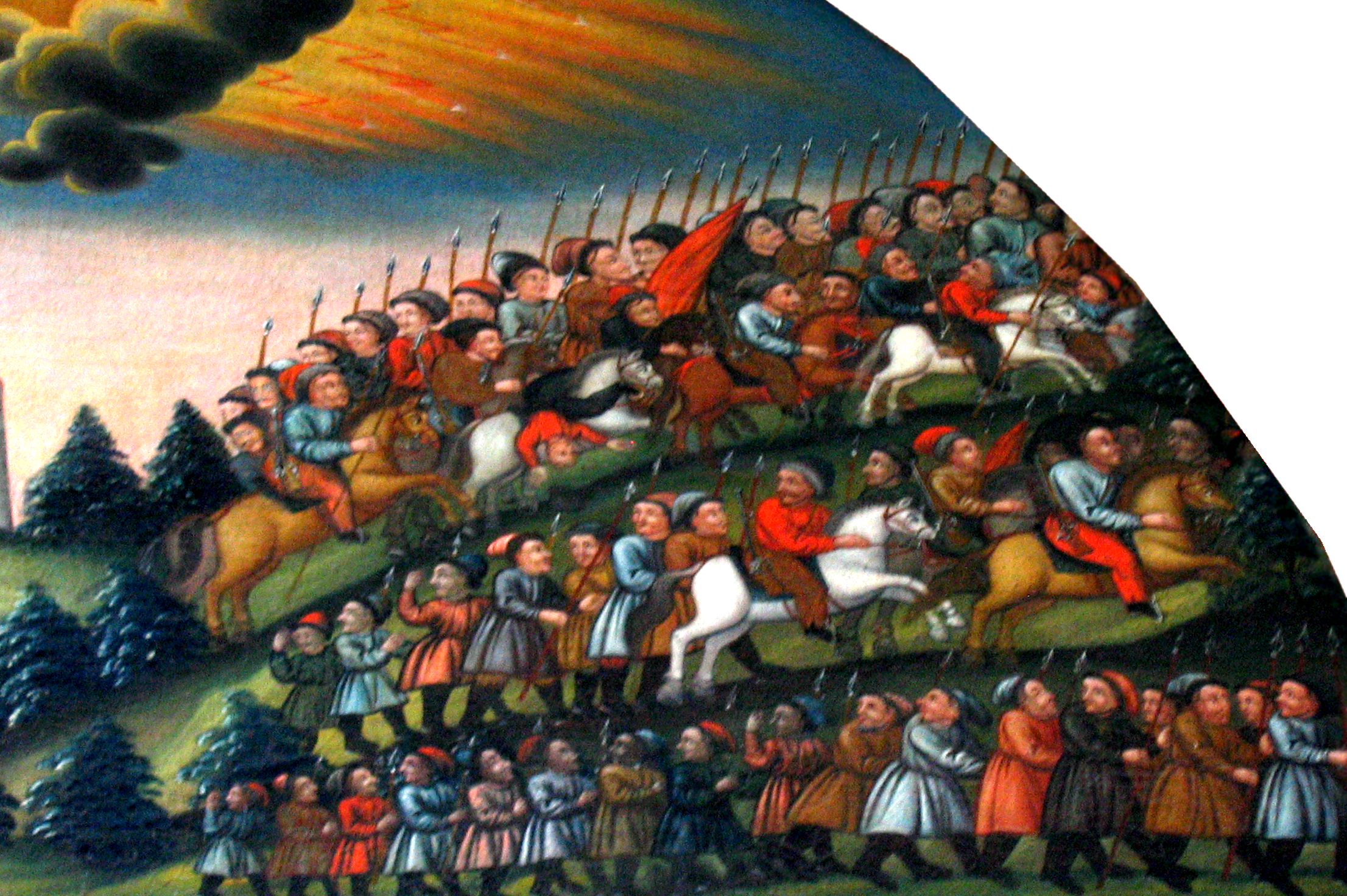בסיעתא דשמיא | ||
☰︎ Menu | 🔍︎
Search // Main //
🖖︎ Prayers & Praxes // 🌔︎ Prayers for the Moon, Month, and Festival Calendar // Commemorative Festivals & Fasts // Fast Days // Khaf Sivan 
תפילה למי שצריך לאכול בימי צום | Prayer for those who need to eat on fast days (A Mitzvah to Eat, 2022)This prayer for those who must eat on Jewish fast days, was shared by Sarah Osborne for A Mitzvah to Eat on Facebook. The Hebrew translation of the prayer was offered by Rabba Dr. Anat Sharbat. . . . אֵל מָלֵא רַחֲמִים | El Malé Raḥamim for the victims of the Chmielnicki massacre (1648-1649), composed in memory of Yəḥiel Mikhel ben Eliezer, the Martyr of Nemyriv (ca. late 17th c.)One of the most prominent martyrs in the Chmielnicki massacres of 1648–1649 was the kabbalist and sage Yəḥiel Mikhel ben Eliezer ha-Kohen, known to posterity as the Martyr of Nemiryv. This unique poetic El Malei Raḥamim was said in his honor, and communities that fast on 20 Sivan still recite it to this day. . . . על אלה אני בוכיה | Ḳinah for the Chmielnicki Massacres of 1648–1649, by Yaaqov Ḳoppel ben Tsvi Margoliyot (1658)A kinah/elegy for those massacred in the Chmielnicki massacres of 1648–1649 composed by a possible eyewitness to the tragedy. . . . שַׁאֲלִי שְׂרוּפָה בָּאֵשׁ | Sha’ali Serufah ba-Esh (Question, Burnt in the Fire), a Ḳinah for Tishah b’Av, translated by Gershom ScholemA translation in German and English of the ḳinnah “Sha’ali Serufah ba-Esh.” . . . אֱלֹהִים בְּעָלֽוּנוּ | Elohim B’alunu — a seliḥah on the York massacre of 1190 by Joseph ben Asher of Chartres (trans. Isaac Gantwerk Mayer)This seliḥah poem, written by R. Joseph of Chartres, commemorates the martyrdom of approximately 150 Jews in Clifford’s Tower, York, England, in the year 1190. A summary of the events of 1190, sometimes referred to as “the English Masada,” can be found here. Like many medieval Jewish poems about massacres, Elohim B’alunu carefully treads the line between assuming guilt and declaring innocence. This poem, interestingly enough, directly calls out the person seen by R. Joseph of Chartres as ultimately responsible — the crusader King Richard Ⅰ. Beloved in Christian memory, this radical zealot of a king has a much darker, more horrific reputation among Jewish and Muslim groups. . . . אֱמוּנֵי שְׁלוּמֵי יִשְׂרָאֵל | Emunei Shlumei Yisrael — a seliḥah witnessing the Blois incident of 1171 by Hillel ben Yaaqov of BonnSome Jewish communities, especially those in the region of the Four Lands, have a custom of fasting on the 20th of Sivan. This day has a full seliḥot service, commemorating a series of horrors that occurred on that day, most prominently the Chmielnicki (Khmielnetsky) massacres of 1648-49. But this poem was written for another horrific occurrence on 20 Sivan, the blood libel of Blois in 1171. This was the first time the accusation of ritual murder was ever made against the Jews of France, but it wasn’t the last. This seliḥah poem, written by Hillel ben Jacob of Bonn, starts with the dramatic accusation that God has abandoned the people Israel, continuing by listing those who died in myriad horrid ways, and ending with several citations from the apocalyptic final chapter of the book of Joel. . . .
Stable Link:
https://opensiddur.org/index.php?cat=4480 Associated Image:
 A detail of a 17th-century painting in the Pszonka chapel of the Lublin Dominican cloister. It depicts the retreat of Bohdan Chmielnicki’s troops from the vicinity of Lublin.(This image is set to automatically show as the "featured image" in category pages and in shared links on social media.) A detail of a 17th-century painting in the Pszonka chapel of the Lublin Dominican cloister. It depicts the retreat of Bohdan Chmielnicki’s troops from the vicinity of Lublin.(This image is set to automatically show as the "featured image" in category pages and in shared links on social media.)
Terms of Use:
Be a mentsch (a conscientious, considerate person) and adhere to the following guidelines:
Additional Notes:
Support this work:
The Open Siddur Project is a volunteer-driven, non-profit, non-denominational, non-prescriptive, gratis & libre Open Access archive of contemplative praxes, liturgical readings, and Jewish prayer literature (historic and contemporary, familiar and obscure) composed in every era, region, and language Jews have ever prayed. Our goal is to provide a platform for sharing open-source resources, tools, and content for individuals and communities crafting their own prayerbook (siddur). Through this we hope to empower personal autonomy, preserve customs, and foster creativity in religious culture. If you like what you've found here, please help keep our project alive and online with your financial contribution.
ויהי נעם אדני אלהינו עלינו ומעשה ידינו כוננה עלינו ומעשה ידינו כוננהו "May the pleasantness of אדֹני our elo’ah be upon us; may our handiwork be established for us — our handiwork, may it be established." –Psalms 90:17
| ||
| Sign up for a summary of new resources shared by contributors each week
  |